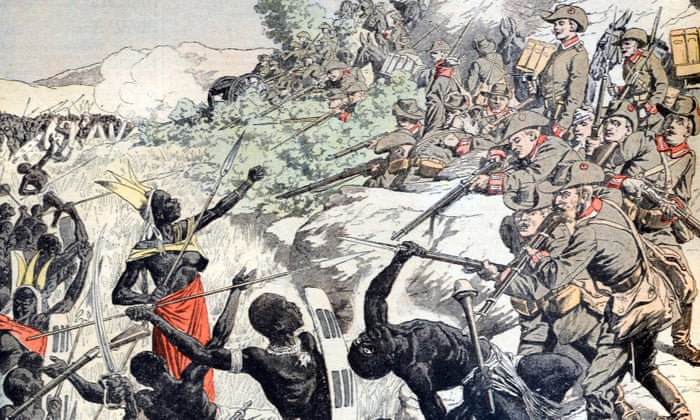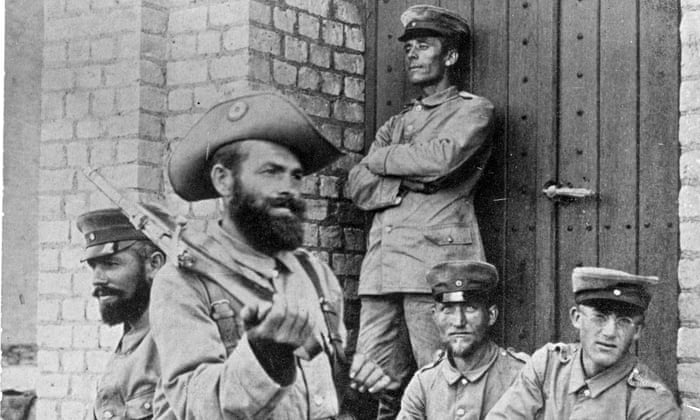Germany's Colonial-Era Practise Run at Genocide
"The only difference is that the Jewish are white in colour and we are black."
"The Germans thought they could keep this issue under the carpet and the world would never know about it. But now we have made noise."
Sam Kambazembi, 51, Herero chief, Waterberg, Namibia
"Whenever I asked her [grandmother] about this, she always said a word or two, and then started crying."
"If you would see an old lady like that crying, it also transferred to you that emotion, the hatred."
Marama Kavita, 43, Herero activist
"They can take it [German monument to soldiers who crushed the rebellion] to Germany, or they can take it to a museum."
"We as Hereros and we as Namibians don't want German soldiers [monument] in front of our State House."
Uahimisa Kaapehi, ethnic Herero city councilor
 |
| A painting depicts German soldiers shooting Herero people in 1904. Photograph: Chris Hellier/Corbis via Getty Images |
Just over a hundred years ago, Germany was on the verge of losing its Namibian colony. Now, a century and more later, Germany is in the negotiation stages with Namibia, owning up to its violent colonialist past and seeking to make amends with the government of Namibia. Like many other European nations, Germany had a stake in what was at that time thought of as South-West Africa.
Germany thought highly of the African colony. Thousands of German settlers gravitated to Namibia to occupy land and to take possession of cattle from local indigenous residents. Understandably enough, the indigenous Herero fiercely resisted the commandeering of their land and their cattle. As traditional cattle herders, they and the Nama tribes valued their heritage and their possessions and fought to retain both from the foreign invaders.
What ensued in Namibia from 1904 and for the succeeding four years was the annihilation of an estimated 80 percent of Herero, at one time as populous as 100,000. In 1904, Lothar van Trotha in his role as German military commander in Namibia stated "every Herero, with or without rifles, with or without cattle, will be shot". A year later, a similar statement of intent was issued targeting the Nama, of whom ten thousand were estimated to have been slaughtered.
 |
| Troops in German south-west Africa (now Namibia) at the time of the Herero revolt of 1904. Photograph: Three Lions/Getty Images |
"It will be described as genocide", baldly stated Ruprecht Polenz, German envoy to Namibia, describing an anticipated wording in a joint statement being worked on, to be released. Now in preparation by the two governments negotiating the wording. How Germany will compensate and apologize to Namibia and its people is also now under negotiation.
"We are talking now about the lives that were lost, the land that was taken, the cattle that was killed, the rape, the lost dignity, the culture that was destroyed. We cannot even speak our language."German soldiers lie buried in a military cemetery, individually identified by name, date and details of death engraved on polished tombstones in Waterberg, Namibia. The names of the countless dead Namibians are unknown, not memorialized as were the infinitely fewer numbers of German soldiers who fought the country's indigenous peoples, other than to refer to them as African "warriors".
"[Thousands of women were systematically raped, often taken as] wives [by settlers]. My great-great-grandfather was German. This relationship was not of love, but a product of force."
Esther Muinjangue, Herero activist, social worker, University of Namibia, Windhoek, Namibia
Germany, it appears, is preparing to acknowledge that what they undertook in the opening years of the 20th century was a genocide, their first. A practise run for a much wider, better planned and executed extermination of another people whom they regarded as scum needlessly cluttering up the Earth whom they were more than prepared to expunge from existence.
Labels: Africa, Colonialism, Conflict, Germany

<< Home